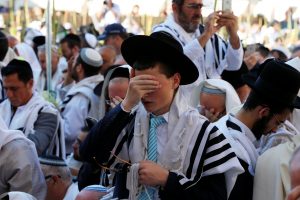
By Luke Baker and Ali Sawafta
JERUSALEM (Reuters) – Muslim elders urged worshippers to return to pray at Al-Aqsa Mosque in Jerusalem on Thursday after Israel backed down in the face of 10 days of often-violent protests and removed all security measures it had installed at the site.
Israel’s decision marks a significant climbdown by Benjamin Netanyahu’s government and comes after days of diplomatic effort by the United Nations, the involvement of President Donald Trump’s Middle East envoy and pressure from countries in the region including Turkey, Saudi Arabia and Jordan.
The dispute began after Israel installed metal detectors, cameras and steel barriers at Muslim entrances to Al-Aqsa compound, also known to Muslims as the Noble Sanctuary, following the July 14 killing of two Israeli policemen by Arab gunmen who had concealed weapons there.
The extra security provoked days of unrest, with violent clashes on the streets of East Jerusalem. Israeli forces shot and killed four Palestinians in the fighting, and a Palestinian man stabbed and killed three Israelis in their home.
Most Muslims have refused to enter the compound for the past two weeks, instead praying in the streets around the Old City.
But Muslim elders declared themselves satisfied that Israeli authorities had reverted to how security was before July 14.
“The technical report showed that all obstacles the occupation (Israel) put outside Al-Aqsa mosque were removed,” said Abdel-Azeem Salhab, the head of the Waqf, the Jordanian-funded trust that oversees Jerusalem’s Muslim holy sites.
“We praise this stand in the past two weeks outside Al-Aqsa and we want this stand to continue outside Al-Aqsa and now inside Al-Aqsa,” he said, urging worshippers to return to pray.
Palestinian political factions issued statements supporting the Waqf announcement, which may help quell the unrest. Before the announcement, factions had been calling for a “day of rage” on Friday, which would probably have fueled the violence.
Jordan, which signed a peace treaty with Israel in 1994 and has been custodian of holy sites in Jerusalem since 1924, said Israel’s removal of the security measures were an “essential step to calm the situation”.
Saudi Arabia said King Salman had been in contact with the United States and other world powers to try to defuse the tensions and had “stressed the need for the return of calm”. It called for respect for the sanctity of the compound.
“King Salman bin Abdulaziz al-Saud, has held contacts with many world leaders over the past few days,” an announcement from the Saudi royal court, published by state news agency SPA, said.
MULTI-FACETED DISPUTE
Palestinian political factions were quick to highlight what they saw as a victory over Israel, with Netanyahu regarded as having backed down. A spokesman for Netanyahu declined to comment on the decision, but the right-wing criticized him.
“Israel is emerging weakened from this crisis, to my regret,” said Education Minister Naftali Bennett, whose right-wing faction is in Netanyahu’s coalition and is a potential challenger for the leadership.
“The truth must be stated. Instead of bolstering our sovereignty in Jerusalem, a message was relayed that our sovereignty can be shaken,” he said.
Netanyahu had insisted that the extra security was needed to ensure safety at the site, which is also popular with tourists. But by taking the steps to bolster security, Israel was materially changing the sensitive status quo, which has governed movement and religious practice for decades.
The Noble Sanctuary contains Al-Aqsa Mosque, the third holiest shrine in Islam, and the golden Dome of the Rock. The area, which sits on a tree-lined marble plateau in the heart of the Old City, is also holy in Judaism, as the site of two ancient temples and is referred to by Jews as Temple Mount.
The dispute, like many in the Holy Land, is about more than security devices, taking in issues of sovereignty, religious freedom, occupation and Palestinian nationalism.
Israel captured East Jerusalem, including the Old City and the holy compound, in the 1967 Middle East war. It annexed the area and declared it part of its “indivisible capital”.
That has never been recognized internationally, with the United Nations and others regarding East Jerusalem as occupied by Israel and maintain that the status of the city can only be determined through negotiations between the parties.
Palestinians do not recognize Israel’s authority in East Jerusalem, which they want as the capital of a future Palestinian state, and are extremely sensitive to the presence of Israeli security forces in and around the Noble Sanctuary.
(Additional reporting by Ori Lewis in Jerusalem and Nidal al-Mughrabi in Gaza; Writing by Luke Baker; Editing by Louise Ireland)









